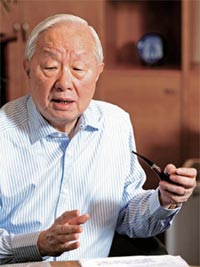![]() Morris Chang, born July
10, 1931, is the founding Chairman of Taiwan Semiconductor Manufacturing
Company Ltd. (TSMC) in 1987. TSMC pioneered the "dedicated silicon
foundry" industry and is the largest silicon foundry in the world.
Morris is known as the father of Taiwan's chip industry.
Morris Chang, born July
10, 1931, is the founding Chairman of Taiwan Semiconductor Manufacturing
Company Ltd. (TSMC) in 1987. TSMC pioneered the "dedicated silicon
foundry" industry and is the largest silicon foundry in the world.
Morris is known as the father of Taiwan's chip industry.
Chang was born in province, China. When he was younger, he had wanted to become a writer. However, his father, an official in the Ningbo county government, persuaded him otherwise. In 1948, as China was in the height of the Chinese Civil War, Chang moved to Hong Kong. The very next year he moved yet again to the United States to attend Harvard University. He transferred to the Massachusetts Institute of Technology and received his Bachelor of Science and Master of Science degrees in Mechanical Engineering from there in 1952 and 1953, respectively. After failing to obtain a Ph.D. from MIT, he sought to find a job and got into the Sylvania Semiconductor. Three years after he worked at Sylvania Semiconductor, he decided that the company wasn't enough for him. Chang moved to Texas Instruments in 1958, which was then rapidly rising in its field. After three years in TI, he rose to be the manager of an engineering section. It was then, in 1961, that Texas Instruments decide to invest in him by giving him the opportunity for his Ph.D. He received his Ph.D. in Electrical Engineering from Stanford University in 1964.
During his 25 year career (1958-1983) at Texas Instruments he rose in the ranks to become Group Vice President responsible for worldwide semiconductor business. He left Texas Instruments to become President and Chief Operating Officer of General Instrument Corporation (1984-1985).
However, after he left General Instrument, the Republic of China (Taiwan) government recruited him to become Chairman and President of the Industrial Technology Research Institute (ITRI). As head of a government-sponsored non-profit, he was in charge of promoting industrial and technological development in Taiwan. Chang founded TSMC in 1987, the beginning of the period where firms increasingly saw value in outsourcing their manufacturing capabilities to Asia. Soon, TSMC become one of the world's most profitable chip makers. Chang left ITRI in 1994 and became Chairman of Vanguard International Semiconductor Corporation from 1994 to 2003 while continuing to serve as chairman of TSMC. In 2005, he handed TSMC's CEO position to Rick Tsai.
As of June 2009, Chang has returned to the position of TSMC's CEO once again.
Chang and his wife Christine Chen reside in Taiwan. His personal interests include classical music and bridge.


